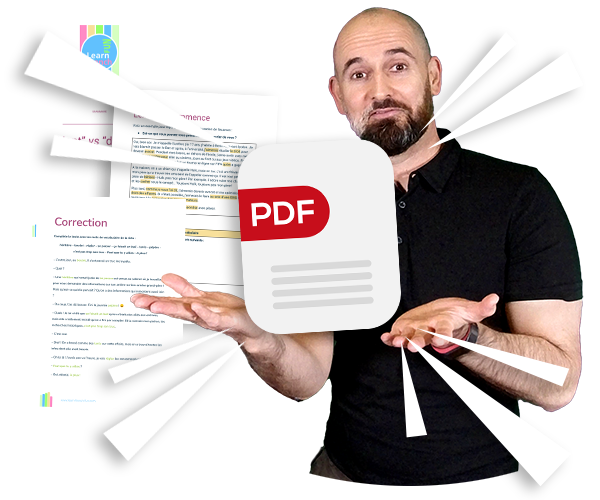Hello my students! I hope you are doing well. Today, I want to share with you the best tips for passing your next French writing exam.
I have good news and bad news:
- The bad news is that I can’t do all the work for you.
- The good news is that if you follow my advice, you will be in a great position to succeed!
If you’re reading this article, it’s because you need to use French in writing.
There are several reasons for this:
- For your studies?
- For work?
- To write love letters? French is the language of love, right?
Several times a year, I go and take the DELF exams, for A1, A2, B1 and B2. And in the candidates’ written productions, we always find the same mistakes!
Obviously, a B2 candidate does not make the same mistakes as an A2 candidate… Although… 😉 Sometimes there are surprises.
Yes, because unfortunately, the quality of spelling has always been a problem.
Some will say to you: “But it is not serious, the main thing is that we understand!”
Yes… Ok… You’ll talk about it to your French teacher the day of the exam 😉 Or to your French-speaking client when you send him an e-mail with 12 mistakes in 4 sentences… Not sure it will help you win contracts 😂

PDF Bonus
We have prepared a free PDF to help you understand and master the best tips for passing your next French writing exam.
👉 Download it for free
At the end, you will have exercises to practice with the correction. 👍
So how can you make fewer mistakes when you write in French?
My first advice, as French is not your mother tongue and it is difficult to concentrate at the same time, on the content (ideas, what you want to say, your arguments, etc.) and on the form (spelling and grammar); do things in steps:
- Step 1: Make a list of what you want to say.
- Step 2: Write the text, focusing on your ideas.
- Step 3: Reread your text slowly and quietly several times to correct any mistakes.
Do you like learning French with videos?
Receive our free video newsletter every Friday in your e-mail box. You will get 3 “Tips & Tricks” on grammar, vocabulary, phonetics or French culture.
👉👉 Sign up now!
I made a little free bonus PDF to help you correct your French mistakes.
In the little Bonus PDF you will find :
- the list of tips to follow to make fewer mistakes in your French written work,
- and exercises to help you find the most common mistakes and correct them by yourself.
So download the Free Bonus PDF now 👍
Ok, but how to correct French mistakes when you don’t know where to look?
First method to correct yourself French mistakes:
The first way is to practice with your teacher. You write a text. He/she corrects it and shows you where the mistakes are, but he does not correct them! It is you, who will correct them.
And then, the teacher explains or helps you when you can’t correct them yourself.
Second method to correct yourself French mistakes:
A second method is to do this training work alone, without help. But for that, you must be very rigorous, “working” like a computer!
Let’s look in detail at where you should look:
Verb + subject
In my opinion, the most important thing is the verbs in your sentences.
- Find the verbs,
- find the subjects,
- match correctly and in the right tense, the verb with the subject.
Note: We have already made a video on YouTube, with a dictation, where I explain how to correctly match the verb with its subject and what are the points you have to check.

PDF Bonus
We have prepared a free PDF to help you understand and master the French past participle agreement in compound tenses.
👉 Download it for free
At the end, you will have exercises to practice with the correction. 👍
Verb conjugation
Know the conjugation of the verbs you use. And especially, the most used verbs (to be, to have, to do, to go, etc) and in all forms… Like “ils” (they) !!!
Why, but why don’t students want to memorize the “ils” (they) form of conjugation??
Little test: give me, in the present tense, the “ils” (they) form of :
- faire (to do)
- devoir (to must)
- vouloir (to want),
- dire (to say),
- savoir (to know)
- and voir (to see)
You have ten seconds to say them.
1… 2… 3… 4… 5… 6… 7… 8… 9… 10…
Well? Was everything correct? 👍👍
And that was only the present tense! Now, imagine the future tense, the conditional tense… And the subjunctive tense, 😱😱 Argh!!
Compound tenses: “être” (to be) or “avoir” (to have)?
We will make a specific video on this, because many students “forget” which verbs are conjugated with “être”…

PDF Bonus
We have prepared a free PDF to help you understand and master the choice of the auxiliary “être” or “avoir” in compound tenses.
👉 Download it for free
At the end, you will have exercises to practice with the correction. 👍
Just a reminder, everything you learned for the “passé composé” works with all the compound tenses:
- être (to be) or avoir (to have)?
- and the rules with the past participle.
This means that you can easily conjugate :
- the “plus-que-parfait“,
- the “futur antérieur“,
- the “conditionnel passé”
- or the “subjonctif passé“!
That is, all the compound tenses! Isn’t that fantastic? 😃😃
Singular or plural?
In the same logic as the verbs, you have to check if the nouns are singular or plural, and therefore :
- don’t forget to put an -s in the plural form!
- don’t forget to put the adjectives in the plural form if there are any!
Last point, in your French writing proofreading, the pronouns.
I know, there are 1000 categories of pronouns in French!
…1000…, I may be exaggerating a bit…
Subject pronouns, tonic pronouns, direct complement pronouns, indirect complement pronouns, possessive pronouns, y, en… 😱
But I’m sure you know how to use them!
Example:
“On parle à quelqu’un ?” ou “On parle quelqu’un ?” (Are we talking to somebody?)
→ “On parle à quelqu’un ?”.
So, If you use a pronoun : “On lui parle”.
Every time you read a pronoun in your text, take the time to check if it is the right one!
By following these rules, you will see that the quality of your French texts will increase greatly! But above all, don’t stress! You should not stress about the quality of your spelling. French spelling is HORRIBLE!
Here is a link to a TED conference video on French spelling (over 1 million views). I highly recommend this video to understand why French spelling is so complicated!
So there you have it! The best tips to help you pass your next French writing exam.
Of course, practice makes perfect, so be sure to write as much as possible in French. And don’t forget to always proofread your work before turning it in.
Are you ready to try out these tips?
Write a French sample text in the comments below and we will correct it!
Articles that might interest you:
- How do you practice French writing?
- French figure of speech: Periphrase
- Figure of speech in French : Pleonasm
- The best tips for passing your next French writing exam
- 5 Common French Writing mistakes and how to avoid them
- Common mistake made when writing in French
- 12 top tips for better French writing
- Learning French from Textbooks




2 thoughts on “The best tips for passing your next French writing exam”
Comments are closed.